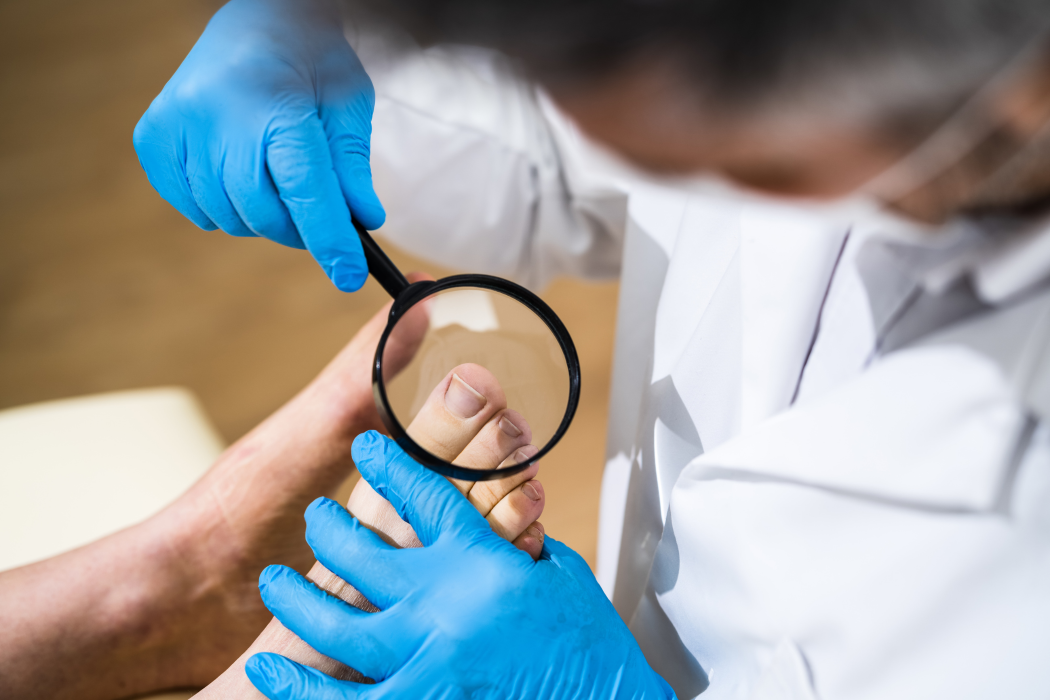Ingrown Toenails In The Elderly: Causes, Treatment, And Prevention

Ingrown toenails are a painful and frustrating condition, and while this holds true for everyone, this is particularly applicable to the
elderly population. As we grow older, the risk of developing ingrown toenails increases due to various factors such as changes in nail
growth, foot structure, and reduced flexibility which leaves us unable to reach our feet in the same way and apply the same care to our
nail cutting that we once could. The most common causes of ingrown nails in older adults and the elderly include:
-
Structural foot abnormalities:
Ageing can bring changes to the structure of the feet, such as the development of bunions, hammertoes, or a loss of fat padding. These
structural abnormalities can exert pressure on the toenails, causing them to grow in a curved or abnormal manner, increasing the likelihood
of ingrown toenails.
-
Nail trauma: Previous injuries to
the toenails, such as stubbing or dropping heavy objects on the toes, can damage the nail bed and alter its growth pattern. This can
contribute to the development of ingrown toenails over time.
-
Footwear choices: Wearing tight or
ill-fitting shoes, particularly those with narrow toe boxes, can compress the toes and exert pressure on the nails. Prolonged use of
improper footwear can encourage ingrown toenail formation.
-
Improper nail trimming: The most
common cause of ingrown toenails is improper nail trimming. Cutting nails too short or rounding the corners excessively can lead to the nail
growing into the surrounding skin, which can cause pain, inflammation, and in some cases, even infection.
How Ageing Affects Our Feet
While most people feel like they ‘slow down’ in their later years, the ageing process
actually has a variety of effects on the feet, which include:
-
Reduced fat padding: Over time,
the fat pads on the soles of our feet tend to thin out, leading to decreased cushioning and shock absorption. This can make walking and
standing for prolonged periods more uncomfortable.
-
Loss of elasticity and flexibility: The
ligaments and tendons in the feet can lose some of their elasticity and flexibility with age. This can result in a reduced range of motion,
making it more challenging to move the feet and toes freely.
-
Decreased muscle strength: As we
age, there is a natural decline in muscle strength and mass throughout the body, including the feet. Weakening of the foot muscles can
affect balance, stability, and the ability to push off properly while walking or engaging in physical activities.
-
Changes in foot shape: Ageing can
lead to changes in the shape and structure of the feet. The arches may flatten or become less pronounced, resulting in a condition known as
fallen arches or flat feet. This alteration in foot shape can contribute to foot pain, instability, and an increased risk of certain foot
conditions.
-
Thickened and brittle nails: The
toenails can become thicker and more brittle with age. This change may make them more susceptible to ingrown toenails, fungal infections,
and other nail-related issues.
-
Dry and thin skin:
Ageing can cause the skin on the feet to become drier, thinner, and more prone to cracking. Reduced oil production and moisture retention
can lead to discomfort and an increased risk of skin conditions, such as dryness, calluses, and corns.
-
Increased risk of foot conditions:
Certain foot conditions become more prevalent as we age. These include bunions, hammertoes, plantar fasciitis, arthritis, and peripheral
neuropathy. These conditions can cause pain, inflammation, stiffness, and decreased mobility.
Treatment Options For Ingrown Toenails In Older Adults
Treatment for ingrown toenails for older adults must be done with caution, as there are
various age-related factors (such a reduction in blood flow to the feet and hence a reduced ability to heal) that can make self-management
more complicated or risky. This is why it’s highly recommended to see a podiatrist for your care, especially if you have other conditions
such as diabetes. Your podiatrist will talk through your best treatment options and weigh them up against the risk factors to ensure a safe
and healthy outcome.
Prevention Tips for Ingrown Toenails In Older Adults
Where possible, we recommend trying to:
-
Have proper nail care: Trim
toenails straight across and avoid cutting them too short. Be cautious not to round the corners excessively, as this can encourage the
development of ingrown toenails.
-
Wear good shoes:
Choose shoes that provide ample room for the toes, avoiding tight-fitting or narrow styles. Opt for footwear made of breathable materials to
promote airflow and reduce moisture accumulation.
-
Maintain good foot hygiene: Keep
the feet clean and dry, paying attention to the areas around the nails. Regularly change socks and avoid prolonged exposure to damp
environments, as moisture can contribute to ingrown toenail development.
-
Have your nails professionally cared for by a podiatrist:
Who can also monitor for any changes in your foot health and help keep you as comfortable as possible on your feet.



.png)

